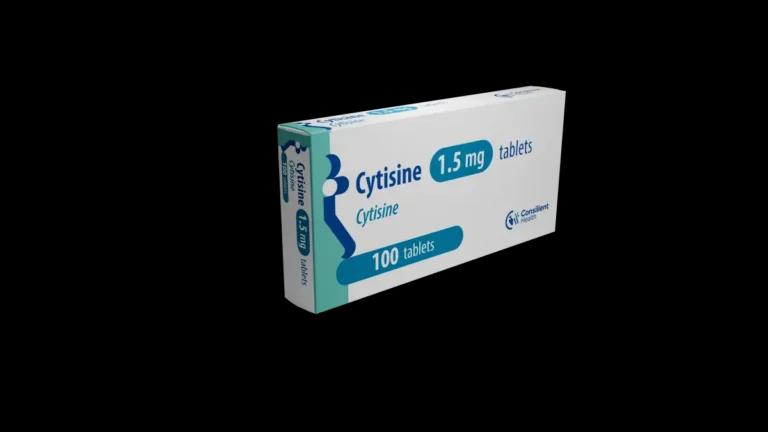
Despite recent declines in the prevalence of smoking, an estimated 1.3 billion people worldwide use tobacco according to the World Health Organization (WHO). Smoking tobacco is a detrimental habit that significantly impacts people’s health. For those who smoke, quitting is crucial for improving their overall well-being. However, many individuals struggle to quit smoking due to nicotine dependence. Nicotine patches and vapes are popular choices to make a quit attempt but other pharmacological interventions are available.
To aid in smoking cessation, drugs known as nicotine receptor partial agonists (NRPAs) have been developed. Two commonly used NRPAs are varenicline and cytisine. In this article, we will delve into the effectiveness and safety of these medications, comparing their abilities to help people quit smoking and any potential unwanted effects they may cause.
Understanding nicotine receptor partial agonists
Before exploring the specifics of varenicline and cytisine, it’s essential to grasp the concept of nicotine receptor partial agonists. NRPAs are medications designed to assist individuals in quitting smoking by reducing withdrawal symptoms and diminishing the pleasure derived from smoking. By acting as both agonists and antagonists, NRPAs maintain moderate levels of dopamine to counteract withdrawal symptoms while decreasing the satisfaction associated with smoking. Varenicline and cytisine are among the most widely available NRPAs.
Varenicline: A highly effective smoking cessation medication
Varenicline, known by the brand name Champix is manufactured by Pfizer. It has shown remarkable efficacy in helping people quit smoking. Numerous studies have demonstrated its superiority over other smoking cessation aids. Varenicline is more effective than bupropion and uses only one type of nicotine replacement therapy (NRT), such as patches alone. The quit rates achieved with varenicline may even be comparable to using multiple forms of NRT concurrently, like patches and gum together.
Research has indicated that varenicline can assist individuals in maintaining continuous abstinence from smoking for at least 6 months. The medication works by binding to nicotine receptors in the brain, reducing cravings and the pleasurable effects of smoking. While varenicline has been proven effective, it’s important to note that it may cause some unwanted effects. These can include nausea, difficulty sleeping, abnormal dreams, and headaches. Although rare, more serious side effects like suicidal thoughts, heart problems, and elevated blood pressure may also occur.
Cytisine: A promising alternative in smoking cessation
Tabex is the original brand name of cytisine and has historically been used medically in Eastern Europe with studies going back to the 1960s. Derived from a plant alkaloid with a structure similar to nicotine.
Cytisine is another nicotine receptor partial agonist on the nicotinic acetylcholine receptors that has shown promise in helping people quit smoking. Similar to varenicline, cytisine is effective in maintaining smoking abstinence for at least 6 months. Some evidence even suggests that cytisine may be as effective as varenicline, although further research is needed to confirm this. However, it’s worth mentioning that cytisine may not be quite as helpful as varenicline in supporting smoking cessation.
As with any medication, cytisine may cause unwanted effects. Common side effects include nausea, stomach problems, difficulties sleeping, and abnormal dreams. Serious adverse events, such as suicidal thoughts, heart problems, and elevated blood pressure are also possible, but relatively rare. It’s important to monitor and evaluate the risks and benefits of cytisine individually.
Comparing Varenicline and Cytisine: Key findings
To better understand the effectiveness and safety of varenicline and cytisine, researchers have conducted numerous studies comparing these medications to other smoking cessation aids. We will use the Cochrane Database of Systematic Reviews that compares the results for different stop-smoking aids used in over 300 clinical trials involving more than 150,000 people using a meta-analysis statistical technique to compare smoking cessation methods against each other, using both direct comparisons within trials and indirect comparisons across trials. The results have provided valuable insights into the benefits and potential drawbacks of each option. Let’s explore the key findings of these comparative studies.
Varenicline vs. placebo and other smoking cessation medications
In studies comparing varenicline with placebo or no medication, varenicline consistently outperformed the control groups, demonstrating its effectiveness in helping people quit smoking. Quit rates for individuals using varenicline were significantly higher compared to those using a placebo, bupropion, or a single form of NRT, such as patches alone. Varenicline may even be as effective as using multiple forms of NRT concurrently, like patches and gum together.
For every 100 people using varenicline to quit smoking, approximately 21 to 25 individuals successfully achieved smoking cessation. In contrast, only 18 out of 100 people using bupropion, a single form of NRT, or two or more forms of NRT were able to quit smoking. These findings highlight the superiority of varenicline in aiding smoking cessation.
Cytisine vs. placebo and varenicline
Comparative studies between cytisine and placebo have shown that cytisine is more effective in helping people quit smoking. For every 100 individuals using cytisine, approximately 18 to 23 successfully achieve smoking cessation. In contrast, only 18 out of 100 people using a placebo were able to quit smoking. These results indicate that cytisine can be a valuable tool in smoking cessation efforts.
When compared directly to varenicline, cytisine has shown similar efficacy in helping people quit smoking. However, it’s important to note that the evidence is limited and further research is required to confirm the comparative effectiveness of these medications.
Safety considerations: Unwanted effects of varenicline and cytisine
While varenicline and cytisine have demonstrated efficacy in smoking cessation, it’s crucial to consider the potential unwanted effects associated with these medications. Varenicline commonly causes nausea, although most cases are mild or moderate and tend to diminish over time. However, individuals taking varenicline may have a slightly increased risk of more serious adverse effects, such as hospitalization. These serious adverse effects, including cardiac issues and neuropsychiatric symptoms, are relatively rare, affecting approximately 2.7% to 4% of varenicline users.
Cytisine, on the other hand, may also lead to some unwanted effects, including nausea, stomach problems, difficulty sleeping, and abnormal dreams. While cytisine users may have a slightly increased risk of serious adverse effects compared to those not taking the medication, the likelihood of these effects occurring is lower compared to varenicline.
Future directions: Further research and considerations
To enhance our understanding of smoking cessation medications like cytisine and varenicline, future studies should focus on several key areas. First, additional research should aim to compare the effectiveness and safety of cytisine with other widely used medications, including varenicline, and explore variations in dosages and treatment durations. These comparative studies will provide valuable insights into the optimal use of these medications in smoking cessation efforts.
Furthermore, it would be beneficial to investigate the effectiveness of varenicline in comparison to e-cigarettes for smoking cessation. Understanding the potential benefits and drawbacks of these alternative smoking cessation methods will help individuals make informed decisions about their preferred approach.
In conclusion, both varenicline and cytisine have demonstrated effectiveness in helping people quit smoking. Varenicline has shown superior efficacy compared to other smoking cessation aids, such as bupropion and single-form NRT. Cytisine, although requiring further research, holds promise as an alternative medication for smoking cessation. As with any medication, it is essential to carefully consider the potential unwanted effects associated with varenicline and cytisine. Future studies should continue to explore the comparative effectiveness and safety of these medications, as well as variations in dosages and treatment durations, to optimize smoking cessation outcomes.
It is important for individuals considering cytisine or Champix to consult with their primary care healthcare provider to determine if it is a suitable option for their specific needs.
Sources
- Can medications like varenicline and cytisine (nicotine receptor partial agonists) help people to stop smoking and do they cause unwanted effects? – Cochrane
- Effect of Cytisine vs Varenicline on Smoking Cessation: A Randomized Clinical Trial – Clinical Pharmacy and Pharmacology – JAMA – JAMA Network
Medical Disclaimer
NowPatient has taken all reasonable steps to ensure that all material is factually accurate, complete, and current. However, the knowledge and experience of a qualified healthcare professional should always be sought after instead of using the information on this page. Before taking any drug, you should always speak to your doctor or another qualified healthcare provider.
The information provided here about medications is subject to change and is not meant to include all uses, precautions, warnings, directions, drug interactions, allergic reactions, or negative effects. The absence of warnings or other information for a particular medication does not imply that the medication or medication combination is appropriate for all patients or for all possible purposes.








